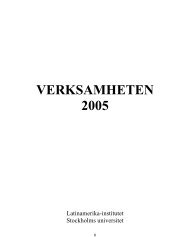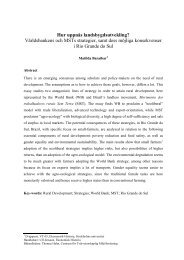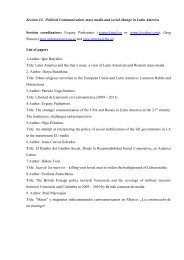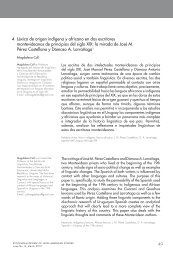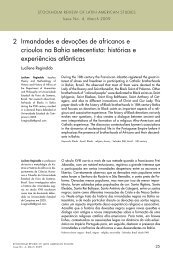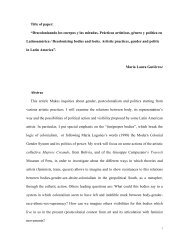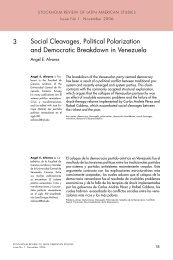Venezuelan Politics and Society in Times of Chavismo PolÃtica y ...
Venezuelan Politics and Society in Times of Chavismo PolÃtica y ...
Venezuelan Politics and Society in Times of Chavismo PolÃtica y ...
Create successful ePaper yourself
Turn your PDF publications into a flip-book with our unique Google optimized e-Paper software.
Tercermundismo <strong>and</strong> <strong>Chavismo</strong><br />
Daniel Hell<strong>in</strong>ger<br />
Celli’s rueful comment on “negritos” evokes<br />
the manner <strong>in</strong> which the discourse <strong>of</strong> Chávez appropriates<br />
<strong>in</strong>tertw<strong>in</strong>ed class <strong>and</strong> racial identities <strong>in</strong><br />
<strong>Venezuelan</strong> political culture. Less appreciated was<br />
the manipulation <strong>of</strong> gender politics by both Chávez<br />
<strong>and</strong> the opposition. On the one h<strong>and</strong>, women occupied<br />
several high positions <strong>in</strong> the cab<strong>in</strong>et <strong>and</strong> for<br />
the first time, the Vice Presidency. The president’s<br />
spouse, Marísabel (whom he later divorced), was<br />
a prom<strong>in</strong>ent advisor <strong>and</strong> public relations asset to<br />
the MVR. On the other h<strong>and</strong>, public op<strong>in</strong>ion surveys<br />
showed that across all social classes men are<br />
more likely than women to support Chávez, which<br />
poses a significant political problem for the president’s<br />
attempt to foster a network <strong>of</strong> grassroots<br />
Bolivarian Circles through the country. Women<br />
head many <strong>of</strong> the social movements frustrated by<br />
the adm<strong>in</strong>istration’s failure to implement fully consultation<br />
with civil society. As with earlier efforts<br />
to <strong>in</strong>corporate women <strong>in</strong>to party organization (see<br />
Friedman 2000), the Bolivarian leadership seems<br />
<strong>in</strong>tent on subord<strong>in</strong>at<strong>in</strong>g women’s <strong>in</strong>terest to other<br />
goals. Much presidential rhetoric is paternalistic, if<br />
not macho. The opposition also has not hesitated to<br />
appeal to baser prejudices <strong>in</strong> the culture, as it did<br />
when it sent women’s panties to military <strong>of</strong>ficers,<br />
clearly imply<strong>in</strong>g that failure to rise up aga<strong>in</strong>st the<br />
president brought <strong>in</strong>to question their mascul<strong>in</strong>ity.<br />
Chávez mobilizes subaltern sentiments aga<strong>in</strong>st<br />
the privileged with appeals to themes deeply <strong>in</strong>gra<strong>in</strong>ed<br />
<strong>in</strong> <strong>Venezuelan</strong> history <strong>and</strong> national identity.<br />
A good example is his national radio <strong>and</strong> television<br />
broadcast <strong>of</strong> June 15, 2001. For several hours the<br />
president held a “conversation” with his audience,<br />
scorn<strong>in</strong>g his critics as “los escualidos”. In a conversational<br />
style, punctuated by friendly asides to<br />
studio workers, he discussed several foreign policy<br />
<strong>in</strong>itiatives, <strong>in</strong>clud<strong>in</strong>g his plans to attend several <strong>in</strong>ternational<br />
conferences <strong>and</strong> visit several foreign<br />
capitals. In this way, Chávez portrays Venezuela as<br />
once aga<strong>in</strong> a player <strong>in</strong> world events, a country shap<strong>in</strong>g<br />
them, not merely at their mercy. In both style<br />
<strong>and</strong> substance his addresses <strong>and</strong> conversational<br />
programs communicate to the economically marg<strong>in</strong>alized<br />
that this president takes them <strong>in</strong>to his confidence.<br />
The very vocal annoyance expressed by opponents<br />
ratifies the perception that he is their voice<br />
<strong>in</strong> a world that otherwise seeks to discard them or<br />
sees their welfare as at best a residual product <strong>of</strong><br />
economic policies that would immediately worsen<br />
their conditions. It would be naïve to th<strong>in</strong>k that ord<strong>in</strong>ary<br />
<strong>Venezuelan</strong> citizens are any more captivated<br />
by discussions <strong>of</strong> presidential it<strong>in</strong>eraries or details<br />
<strong>of</strong> domestic policy than are most other people. The<br />
middle class f<strong>in</strong>ds the programs especially tedious,<br />
but they are not the target audience.<br />
Another use <strong>of</strong> the media is to convey <strong>of</strong> the<br />
chavista hermeneutics about history. In his June 15<br />
broadcast, the president followed news <strong>of</strong> his foreign<br />
policy <strong>in</strong>itiatives with an exhortation to his audience<br />
to read Ramón Velásquez’s book on the fall<br />
<strong>of</strong> the “yellow liberal” regime <strong>in</strong> 1899. Display<strong>in</strong>g<br />
several photos <strong>of</strong> the troops <strong>of</strong> General Cipriano<br />
Castro, leader <strong>of</strong> the <strong>in</strong>surgents, he proclaimed,<br />
These are the troops <strong>of</strong> the Liberal Restoration Army<br />
<strong>of</strong> General Cipriano Castro. …They came from the<br />
Andes. …Here is the camp. Venezuela is at war, end<strong>in</strong>g<br />
the century at war because <strong>in</strong>dependence, as Bolívar<br />
recognized, managed to break the cha<strong>in</strong>s <strong>of</strong> Spa<strong>in</strong> but<br />
not to complete the social revolution. [To someone <strong>in</strong><br />
the studio.] Put the photo up aga<strong>in</strong> so that you can<br />
see …here it is…this is a poor people. See them, with<br />
their banners, shoeless, with their old drums, their<br />
coronets, <strong>and</strong> their leader, Cipriano Castro, <strong>in</strong> front,<br />
a people seek<strong>in</strong>g justice because after Independence<br />
they were betrayed, <strong>and</strong> today they cont<strong>in</strong>ue seek<strong>in</strong>g<br />
justice. We thank God that one hundred years later<br />
we are embarked on this course without a war; we<br />
are embarked on a peaceful battle, <strong>in</strong> a democratic<br />
battle. A God, the Virg<strong>in</strong>, <strong>and</strong> everybody is call<strong>in</strong>g to<br />
the country to struggle to make this road victorious.<br />
It will be so <strong>in</strong> order to avoid that th<strong>in</strong>gs turn out to<br />
repeat themselves as they have throughout <strong>Venezuelan</strong><br />
history. (Chávez Frías, 2001)<br />
Here Chávez takes as his model a controversial,<br />
<strong>of</strong>ten reviled figure evok<strong>in</strong>g obvious comparisons<br />
to his own situation. Cipriano Castro, like Chávez,<br />
is depicted most <strong>of</strong>ten as a charismatic, nationalist<br />
Stockholm REVIEW OF Lat<strong>in</strong> American Studies<br />
Issue No 1. November 2006<br />
12








